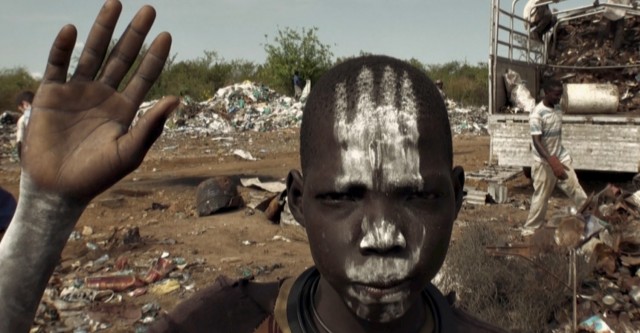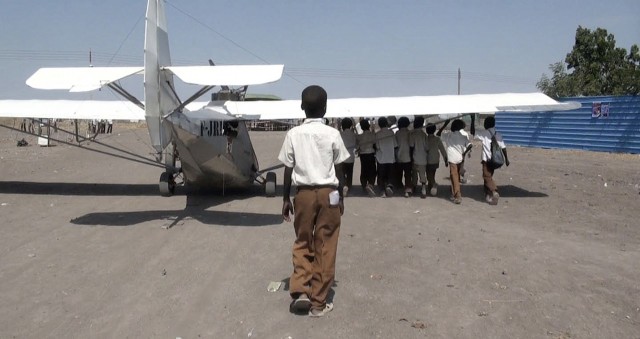WE COME AS FRIENDS (Hubert Sauper, 2014)
IFC Center
323 Sixth Ave. at Third St.
Opens Friday, August 14
212-924-7771
www.wecomeasfriends.com
www.ifccenter.com
 As Hubert Sauper’s We Come as Friends opens, a naked young African boy is walking down a deserted road, carrying an empty plastic water bottle. He smiles into the camera as he heads toward the blazing hot sun. The scene recalls Jamie Uys’s The Gods Must Be Crazy, a 1980 comedy in which the arrival of an empty Coke bottle, dropped from the sky, has a profound effect on a South African tribe living in solitude in the Kalahari Desert. But We Come as Friends is no fictional farce as a filmmaker, not a Coke bottle, drops from the sky to let Africans reveal how world powers are still employing old methods of colonialism to exploit, and essentially steal, valuable resources from African nations in the twenty-first century. “Did you know that the moon belongs to the white man?” a man asks early on. In the 2014 documentary Concerning Violence: Nine Scenes from the Anti-Imperialistic Self-Defense, Swedish filmmaker Göran Hugo Olsson used rare archival footage to explore European colonialism through the words of Frantz Fanon’s 1961 book, The Wretched of the Earth. In We Come as Friends, French-based filmmaker Sauper, whose life was threatened after he made the Oscar-nominated Darwin’s Nightmare, which examined the wide-ranging impact of the introduction of the Nile perch to Lake Victoria in Tanzania, journeys to Africa in Sputnik, a tiny plane he built himself, to uncover the current wave of colonialism as South Sudan prepares to vote on its independence in 2011. Sauper meets with villagers, warlords, international diplomats, Christian missionaries, soldiers, Arab and Chinese workers, and others while photographing various military operations, burials, and protests. “The local people have to learn how to need money — and how to give up their ancestors’ land,” Sauper narrates. And of course, they do so at ridiculously cheap prices that recall the purchase of Manhattan from the Native Americans.
As Hubert Sauper’s We Come as Friends opens, a naked young African boy is walking down a deserted road, carrying an empty plastic water bottle. He smiles into the camera as he heads toward the blazing hot sun. The scene recalls Jamie Uys’s The Gods Must Be Crazy, a 1980 comedy in which the arrival of an empty Coke bottle, dropped from the sky, has a profound effect on a South African tribe living in solitude in the Kalahari Desert. But We Come as Friends is no fictional farce as a filmmaker, not a Coke bottle, drops from the sky to let Africans reveal how world powers are still employing old methods of colonialism to exploit, and essentially steal, valuable resources from African nations in the twenty-first century. “Did you know that the moon belongs to the white man?” a man asks early on. In the 2014 documentary Concerning Violence: Nine Scenes from the Anti-Imperialistic Self-Defense, Swedish filmmaker Göran Hugo Olsson used rare archival footage to explore European colonialism through the words of Frantz Fanon’s 1961 book, The Wretched of the Earth. In We Come as Friends, French-based filmmaker Sauper, whose life was threatened after he made the Oscar-nominated Darwin’s Nightmare, which examined the wide-ranging impact of the introduction of the Nile perch to Lake Victoria in Tanzania, journeys to Africa in Sputnik, a tiny plane he built himself, to uncover the current wave of colonialism as South Sudan prepares to vote on its independence in 2011. Sauper meets with villagers, warlords, international diplomats, Christian missionaries, soldiers, Arab and Chinese workers, and others while photographing various military operations, burials, and protests. “The local people have to learn how to need money — and how to give up their ancestors’ land,” Sauper narrates. And of course, they do so at ridiculously cheap prices that recall the purchase of Manhattan from the Native Americans.
It’s infuriating how so many people go on record still referring to Africans as if they are savages or children, unable to take care of themselves. “It is easy to pick out natural resources and leave,” Hillary Clinton is shown saying. “We don’t want to see a new colonialism in Africa.” But that’s precisely what is happening, and it’s all about the oil — and the answer is a whole lot more complicated than trying to throw a Coke bottle off the edge of the planet. The film is a startling piece of investigative journalism by a brave explorer willing to risk his life to show the world the truth. Sauper is like an alternate Captain Kirk — who, the director has noted in interviews, is a kind of space-age imperialist himself, based on Captain James Cook — traveling through Africa in his own Enterprise, boldly going where no one has gone before. Winner of the Peace Film Prize at the Berlinale and a Special Jury Award for Cinematic Bravery at Sundance, We Come as Friends opens August 14 at the IFC Center, with Sauper participating in several Q&As over the weekend, including on Friday night at the 7:40 show moderated by the Yes Men’s Jacques Servin (who participated in the making of the film), Saturday afternoon at 2:45 with Marshall Curry (Street Fight), and Saturday night at 7:40 with Josh Fox (Gasland).

